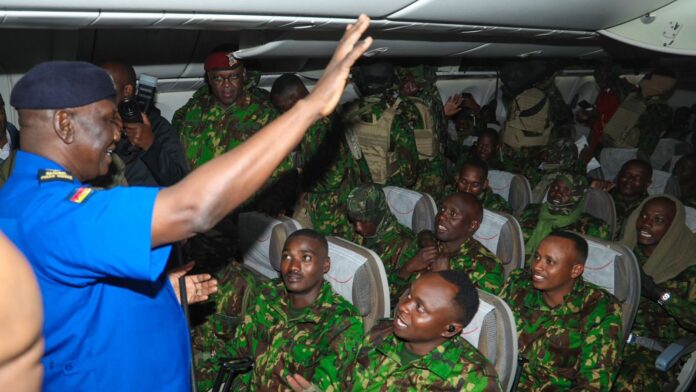Inspector General of Police Douglas Kanja said his office has not received formal directions regarding the changes by the United Nations Security Council to replace Kenya in leading the Multinational Security Support Mission in Haiti.
On Tuesday, September 30, the UN council voted to replace Kenya, which has been leading the exercise to combat gangs and restore order in the violent, torn Caribbean nation since June 2024.
The UN Security Council backed a resolution, co-authored by the US and Panama, to transition the Kenyan-led Multinational Security Support Mission (MSS) for Haiti into the Gang Suppression Force (GFS).
The GFS will run under an initial 12-month mandate, while working in close collaboration with the Haitian National Police (HNP) and the Haitian Armed Forces (HAF) to conduct operations to neutralize gangs, provide security for critical infrastructure, and support humanitarian access.
It is expected that the GFS will consist of a 5,550-strong force, which will protect vulnerable groups, support the reintegration of former fighters into communities and help strengthen Haitian institutions.
Speaking at the Embakasi Police Campus on Wednesday, Kanja said they are waiting for communication from the relevant authorities regarding the fate of more than 800 Kenyan officers serving in Haiti.
“We saw what happened and we are waiting for the directions from the relevant agencies then we will know what will happen. Remember such directions are issued by the UN Security Council,” he said.
He added Kenyan police have been and are ready for the mission.
Kanja spoke when he inaugurated a team to oversee a planned police recruitment exercise.
Kenya, which led the MSS mission approved in 2023, has welcomed the transition to GFS.
Foreign Affairs Principal Secretary Korir Sing’oei on Wednesday endorsed the mission for it has a robust mandate including conducting intelligence-led counter-gang operations to neutralize, isolate, and deter gangs.
According to Singo’ei, “this is a policy decision to be made in due course and will be communicated.”
Questions now remain on whether Kenya will transition to the new GFS and if the Kenya police on the ground will make part of the 5550 members of the force, or will the country be required to add more.
The GSF shall comprise a contingent of 5500 police and military officers bolstered by a UN Technical Office which will assume full responsibility for among others, the provision of logistical support for the GSF and resource mobilization.
The new Mission also has a robust mandate including conducting intelligence-led counter-gang operations to neutralize, isolate, and deter gangs.
GSF will be lethal and beefed up force, supported by both a newly created U.N. Support Office and the Organization of American States. U.S. officials argued that a new, scaled-up and more lethal effort was needed.
Also, the new mission needed to be able to work independently of the Haitian police, something the MSS’ mandate did not allow, which meant that security forces struggled to reduced gangs’ territorial controls as gunmen coordinated and simultaneously launched attacks in different corners of the country.
Among the changes that were pushed was stronger language to ensure children and women are safe, by stressing their recruitment and rape by gangs, and for Haiti to do more to address the root causes of instability and carry out reforms in its governance system.
The push was made by Denmark.
Ultimately, the goal of the new suppression force is to support the Haitian police and the Haitian armed forces, and national institutions to ensure security conditions are conducive to holding free and fair elections, and that humanitarian aid can be accessed safely and in a timely manner.
Like the MSS, the new force will still have a force commander in charge.
But now, it will be overseen by a group of countries representing the coalition of the willing, troop contributing countries.
How often will they meet, how will they settle differences, is one of the glaring issues with the proposal say experts on peacekeeping missions when you consider that soldiers and police who’ve never trained or work together are being asked to fight together without a clear support.
Also, the new force will be reporting up through a special representative, a civilian who will provide oversight and political direction.
It will still rely on voluntary contributions to fund its personnel, however, its operations and logistics, including the current U.S.-constructed base in Port-au-Prince, will be overseen by the new U.N. Support Office.
In the resolution, the U.N. is asked to provide technical support to the Organization of American States, which is also tasked with providing assistance to both the GSF and Haiti National Police in the form of provisions of food and water, fuel, transport, tents, defense stores and appropriate communication equipment.
The resolution also makes specific reference to the Haitian armed forces, a sign of the increasingly important role they must play in the fight.
The newly named special representative will also be responsible for coordinating with the U.N., and the OAS on the deployment of such a package to ensure it strengthens joint operations between the GSF and the Haitian police, including through the construction of operational facilities and security infrastructure supporting joint planning and oversight of operations by both forces.
What remains unclear is the cost of the new mission, and where the funding for the logistics will come from.













